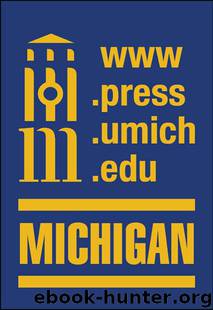Rogues and Early Modern English Culture by Dionne Craig & Mentz Steve

Author:Dionne, Craig & Mentz, Steve
Language: eng
Format: epub
Publisher: The University Of Michigan Press
PART 3
Rogues and the Early Modern City
ADAM HANSEN
Sin City and the “Urban Condom”
Rogues, Writing, and the Early Modern Urban Environment
The Prophylactic and the Proximate
Richard Sennet’s brilliant interrogation of Western urban experiences, Flesh and Stone, describes the process by which the “unclean” Jewish social body was divided from the rest of Venetian Renaissance society in a “prophylactic space,” founded on spiritual, moral, and material edifices:
In Venice, the physical character of the city made it possible finally to realize the rule prescribed by the Lateran Council—Venice a city built on water, water the city’s roads which separated clusters of buildings into a vast archipelago of islands. In the making of the Jewish Ghetto, the city fathers put the water to use to create segregation: the Ghetto was a group of islands around which the canals became like a moat. (215, 228, 216)
The “spatial solution” to deal with “impure” Jewish bodies employed “an ancient Venetian urban form, the sottoportegho ” (227, 232). Locked doors, water-gates, and surveillance prevented inappropriate proximities. Jews did not endure this alone of course; Germans, Greeks, and Turks suffered similar regulation. Such groups were granted contact with the rest of Venice only as economic necessity dictated. In some senses, ghettoization, despite the heinous privations it enforced, was beneficial to the Jews: during Lent, 1534, Christian mobs could not attack when the windows were closed and the bridges drawn up. Equally and crucially, though densely overcrowded and uncomfortable, the space was not burdened with the transformative responsibilities of the Roman ghetto. Rome needed to convert its landlocked, close-living inhabitants. In Venice, a city of islands, insulae, it was much more practical to enact isolating measures. Yet such insulation was completely impossible in what would soon become the greatest city of the age: London.
The Italian Renaissance spawned a Christian-humanist drive to organize the urban world, intent on shaping motley early modern cities in a manner “closer to the rational order of the cosmos” (Paster 26–27). But as Brian R. Goodey comments, Thomas More’s paradigmatically humanist Utopia, of course, “cannot be mapped” (21). More also imposed the “traditional rivalries of the English gardeners” onto the urban context of his seemingly pleasant paradise, wryly recognizing the potential for contention in any state, however contrived (26). An insightful Londoner could truly do little else.1
For the capital, and images of it, evinced the coalescence of seemingly contrary elements and forces, presenting a topography of ambiguity, incontinence, and proximities, proximities that confounded crude binary oppositions, whether spatial, cultural, social, or literary. Thomas Dekker addressed London as such in his Seven Deadly Sinnes (1606):
Download
This site does not store any files on its server. We only index and link to content provided by other sites. Please contact the content providers to delete copyright contents if any and email us, we'll remove relevant links or contents immediately.
| Ancient & Classical | Arthurian Romance |
| Beat Generation | Feminist |
| Gothic & Romantic | LGBT |
| Medieval | Modern |
| Modernism | Postmodernism |
| Renaissance | Shakespeare |
| Surrealism | Victorian |
4 3 2 1: A Novel by Paul Auster(12375)
The handmaid's tale by Margaret Atwood(7757)
Giovanni's Room by James Baldwin(7326)
Asking the Right Questions: A Guide to Critical Thinking by M. Neil Browne & Stuart M. Keeley(5759)
Big Magic: Creative Living Beyond Fear by Elizabeth Gilbert(5754)
Ego Is the Enemy by Ryan Holiday(5414)
The Body: A Guide for Occupants by Bill Bryson(5080)
On Writing A Memoir of the Craft by Stephen King(4935)
Ken Follett - World without end by Ken Follett(4723)
Adulting by Kelly Williams Brown(4565)
Bluets by Maggie Nelson(4547)
Eat That Frog! by Brian Tracy(4526)
Guilty Pleasures by Laurell K Hamilton(4439)
The Poetry of Pablo Neruda by Pablo Neruda(4097)
Alive: The Story of the Andes Survivors by Piers Paul Read(4018)
White Noise - A Novel by Don DeLillo(4002)
Fingerprints of the Gods by Graham Hancock(3996)
The Book of Joy by Dalai Lama(3976)
The Bookshop by Penelope Fitzgerald(3844)
